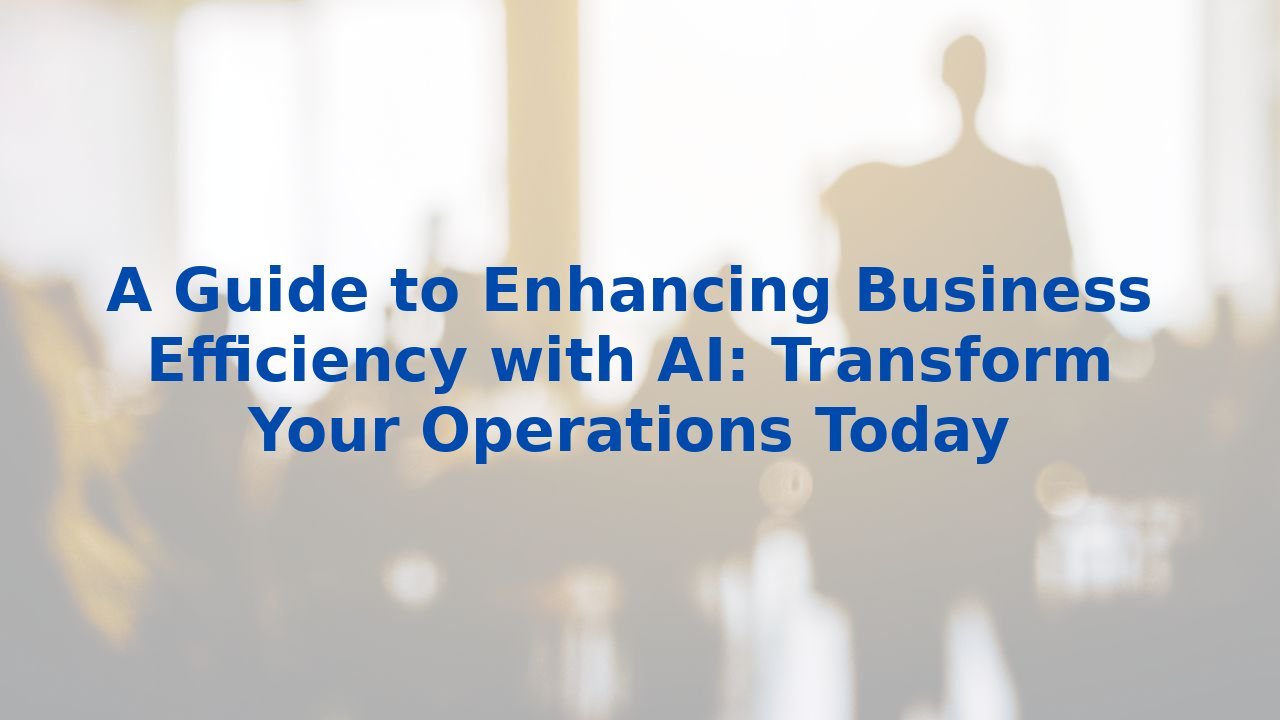A Guide to Enhancing Business Efficiency with AI: Transform Your Operations Today
A Guide to Enhancing Business Efficiency with AI: Transform Your Operations Today
Introduction
In the relentless hustle of the modern business landscape, efficiency isn't just a goal—it's a necessity. Enter artificial intelligence (AI), a revolutionary force that has reshaped the boundaries of what operational efficiency means. Businesses are now harnessing AI to streamline processes, enhance productivity, and redefine workflows. This guide dives deep into how AI can optimize your operations and unlock a new era of efficiency.
1. Automating Routine Tasks
Consider the mundane tasks that consume your team's valuable time. AI's capacity for automation revolutionizes the way organizations handle repetitive duties. Imagine AI-driven tools tirelessly performing document processing tasks—extracting and analyzing data from documents at lightning speed. This powerful automation frees your talented employees to engage in strategic initiatives that create meaningful impact.
2. Improving Decision Making
Within every organization lies a wealth of data, but the challenge often lies in making sense of it all. AI excels in transforming raw data into actionable insights. By sifting through vast amounts of information, AI reveals emerging trends, forecasts outcomes, and pinpoints the root causes of critical challenges. This informed, data-driven decision-making foundation not only reduces the potential for errors but propels your business strategy to new heights.
3. Process Optimization
Business processes are the lifeblood of any organization, and AI stands ready to refine them. By leveraging machine learning and advanced analytics, businesses can assess and enhance processes with pinpoint accuracy. For instance, if your organization struggles with outdated methods for handling purchase orders, imagine the time saved through AI-driven automation. Not only does this streamline operations, but it also opens the door to innovative growth opportunities.
4. Enhancing Customer Service
The customer experience is critical, and AI is reshaping how businesses engage with their clients. Picture chatbots engaging with customers for preliminary inquiries, efficiently collecting feedback, and identifying trends from customer interactions. This shift not only elevates customer satisfaction but also liberates human representatives, allowing them to handle more complex challenges—ultimately transforming your service department into a powerhouse of efficiency.
5. Supporting Sales and Marketing
In sales and marketing, where time is of the essence, AI is your secret weapon. Imagine AI analytics predicting revenue-generating customers and providing insights that allow sales teams to focus their efforts effectively. Envision chatbots personalizing each prospect’s journey, guiding them through the sales funnel at their pace. With AI, your teams can maximize their output while maintaining a responsive, personalized approach.
6. Improving Product Development
The pace of product development has accelerated with AI's generative design capabilities. AI enables the exploration of multiple design possibilities based on predetermined parameters, aiding teams in swiftly producing and testing prototypes. This not only conserves time and resources but also results in innovative products that resonate with market demands. Imagine launching products that not only meet expectations but exceed them—therein lies the power of AI.
7. Continuous Improvement
AI's commitment to continuous improvement cannot be overstated. By offering real-time feedback and recommendations, AI empowers businesses to monitor and adjust processes proactively. This ensures the organization can adapt swiftly to market changes or internal challenges, driving alignment with strategic objectives. In today's dynamic environment, organizations that continuously evolve will undoubtedly thrive.
The Role of Training in AI Adoption
While AI offers immense potential, the success of these technologies hinges on one crucial factor: training. Empowering your employees to effectively integrate AI tools is paramount. Comprehensive training programs should focus on equipping your workforce with the skills needed to navigate this new landscape confidently. As employees gain proficiency, they become invaluable partners in harnessing AI's potential rather than being replaced by it. Upskilling and reskilling not only enhance organizational efficiency but also foster a culture of innovation and adaptability.
Conclusion
The integration of AI into everyday business processes brings forth a transformative wave of efficiency that is impossible to ignore. Organizations that leverage AI to automate tasks, enhance decision-making, and optimize processes are poised to excel in today’s competitive environment. However, to tap into the full potential of AI, businesses must prioritize training their workforce—not merely as a necessity but as an opportunity to redefine their operational paradigms.
By embracing AI wholeheartedly and nurturing a culture of learning around it, organizations are not just investing in technology; they are investing in their future success. So, dare to transform your operations today and step into a world where efficiency and innovation know no boundaries.



